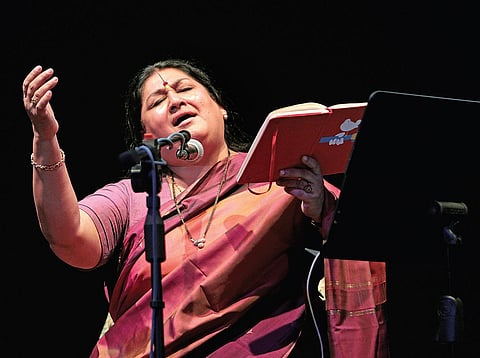

Shubha Mudgal is that rare Indian musician: a dissenting voice against division in society and politics. It also perhaps makes her the perfect songbird. She says, “Indian music attracts huge crowds and applause worldwide because of its innate power to move the hearts of listeners and the contribution of countless people who have worked for it.” This year she is working on a new book after last year’s short story collection Looking for Miss Sargam, which includes one on a India-Pakistan peace concert which didn’t work out as planned. In fact, her book has been shortlisted for the 2020 AutHer Awards.
Few classical musicians are as successfully versatile as Shubha. Both Ab ke saawan or Ali more angana are rock Shubha-style. She is a composer, an advisor for a record label, founder of her own online label, musical educationist, and author. This year has kept her busy. From taking part in the anti-CAA protest at Shaheen Bagh in Delhi and participating in ‘Arth’, the three-day Indian literature, dance and music, theatre and cuisine festival in the capital, to regaling audience at the ‘Namaste Orcha’ festival that showcased the arts, crafts and local delights of the Orcha region in Madhya Pradesh, Shubha has had a hectic schedule so far. Born in Prayagraj (then Allahabad), her idea of India as an artist was born out of a love for English
Literature and Kathak before discovering her passion for music. Here too, she has mastered the art of striking the perfect balance between the thumri, khayal, dadra and Indi-pop. Shubha says, “Music has a universal language, which is why Indian music receives such tremendous response in many parts of the world. Pandit Ravi Shankar, Ustad Zakir Hussain, and lesser-known individuals like Dr Balwant Dixit, a faculty member at the University of Pittsburgh, have worked tirelessly to promote Indian music overseas.”
Shubha is a music activist dealing with the issues of the marginalised and under-appreciated in Indian society. “Art cannot be made in isolation,” she says. She rues the fact that folk music is often overlooked and is not a priority for most cultural policy-makers. She stresses that policies and projects that provide sustained support to the arts and create a better and more secure future for performers is the only way to preserve this legacy. “For centuries artistes have responded to the times they live in and work in, often creating works that hold up a mirror to society.
When Kabir Das supposedly wrote Sadho dekho jag baurana (Look, the world has lost its balance), he was raising his voice against communalism. As a student of music, I am happy to take this tradition forward,” she says. Her earliest memory of music is of her mother singing to her and her father playing the flute. Her teachers are more eminent and are the who’s who of Indian classical music. So who is the one legend of the past she would have loved to perform a jugalbandi with? “I don’t think I could ever have had the audacity to do so. But I would have loved some fangirl moments with Begum Akhtar and Siddheshwari Devi,” she says.
“Music has a universal language, which is why Indian music receives such tremendous response in many parts of the world.”